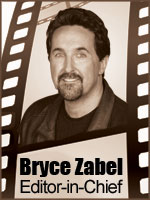 The Smackdown
The Smackdown
It can’t be easy being a young criminal crime boss and drug lord, coming from a struggling underclass, living in the shadow of an even more powerful criminal. Both Frank Lucas and Michael Corleone step out on their own in “American Gangster” and “The Godfather, Part II” and become, in many ways, even more frightening than that which spawned them. Both killers also love their families (or say they do). This crime story Smackdown not only pits the great actors of their respective generations (Al Pacino & Robert DeNiro, Denzel Washington & Russell Crowe) against each other but two of the most accomplished directors: first Francis Ford Coppola, and now, Ridley Scott.
The Challenger
“American Gangster” is based on the true story of Harlem drug kingpin Frank Lucas who cornered the heroin market in his part of NYC about thirty years ago. In the script by Steve Zaillian directed by Ridley Scott, we see how Lucas made a staggering amount of money by being what he thought of as a better businessman — his H was twice as pure and twice as cheap as the competition on the streets, and he even branded it as “Blue Magic.” Lucas, played to perfection by Denzel Washington, has that explosive coolness he manifested in “Training Day” and packaged into a film that feels, at times, epic by showing his roots as a driver, bodyguard and “collector” for another Harlem bad-ass (with class!) named Bumpy. Lucas, shall we say, has a couple of different sides to his personality: in the opening scene he sets a man on fire and empties a gun into him, but later he buys a mansion and moves his dirt poor family in with him. “Gangster” has a duality to its structure, too, in that almost equal screen time is given to the character of Richie Roberts, the squeaky-clean detective who eventually took Lucas down and two-thirds of the corrupt New York drug cops with him. Played by Russell Crowe, Roberts is our counter-point in more ways than good-vs-evil: his own family is falling apart, even as Lucas’s is spending quality time together.
[singlepic id=32 w=320 h=240 float=right]
The Defending Champion
“The Godfather, Part II” is considered by most people to be the best film sequel of all-time. Like the film that spawned it, “II” also won the Oscar for Best Picture. It does this by giving us the prequel and the sequel to what came before; Robert DeNiro stars as the young Vito Corleone who became the Marlon Brando Don Corleone, and Al Pacino steps into the role of the new Godfather. Michael spends the film consolidating his power and losing his soul, clearly intended to be a tragic figure. This is a film that requires an active participation on the part of its audience; there are a lot of moving parts. What gives this film its extreme power apart from its predecessor is the poignancy of seeing the favored son, clean-cut college boy Michael Corleone pick up the family business because no one else can, and our discovery (and his) that he’s so damned good at it.
The Scorecard
The powerful draw of both films, of course, is how they twist our perception of family. Frank Lucas and Michael Corleone talk like they’re upholding sacred family values even as they violently deprive others of sharing them with their own families. You actually see this often in Hollywood where the executives often talk like they care so much for the people who work for them, but when it comes to business, they treat them as rubbish. Come to think of it, that pretty much explains the current Writers Strike. On the score, however, “The Godfather, Part II” is the better film because the rot of the Corelone family is laid out in such superb detail. Remember Fredo, anyone?
As long ago as 1948, culture critic Robert Warshow coined the phrase “the gangster as tragic hero” in writing about crime bosses, and it’s clear that both Frank Lucas and Michael Corleone fit this description. Both roles are inhabited by such powerful, spot-on actors that you actually find yourself shocked when they do the terrible things they do because, frankly, you like them so much. Because Pacino had a character that tracked a more substantial change than Washington does, he ultimately wins this event but only by a hair. Also, Pacino really does inhabit a family dynasty and Washington is the small-time hood with big dreams (of importing heroin from Vietnam, it turns out).
Both films have structure that detracts from their main power. In “The Godfather, Part II,” the moving backward and forward in time sometimes prevents our complete involvement in one story by breaking the tension. In “American Gangster,” we have two storylines, related only a little at the beginning, that drive toward a final confrontation. The thing is we never actually see Frank or Richie in a scene together until the very end and, when we do, it’s a bit of a letdown. The Russell Crowe scenes simply are not as powerful as the Denzel Washington scenes. On the other hand, they do feel more like they belong to the central premise of the film than the ones in “The Godfather, Part II.” Advantage, “American Gangster.”
The Decision
“American Gangster” is the best commercial film out in the theaters today and it’s not a disappointing investment in your entertainment budget. “The Godfather, Part II” is flawed where “The Godfather” was not. But damn, there is a timeless quality to the champion that cannot be dismissed. Its power transcends any flaws in execution and it stands above the competition, even today, over thirty years later. The winner and still champion is “The Godfather, Part II.”

Leave a Reply